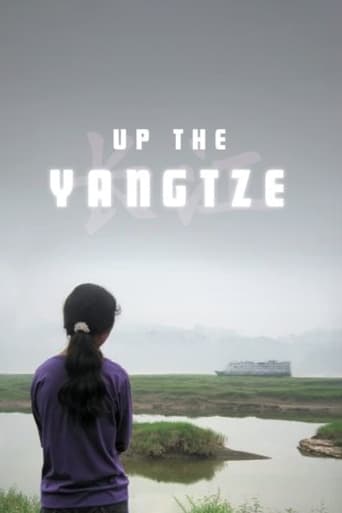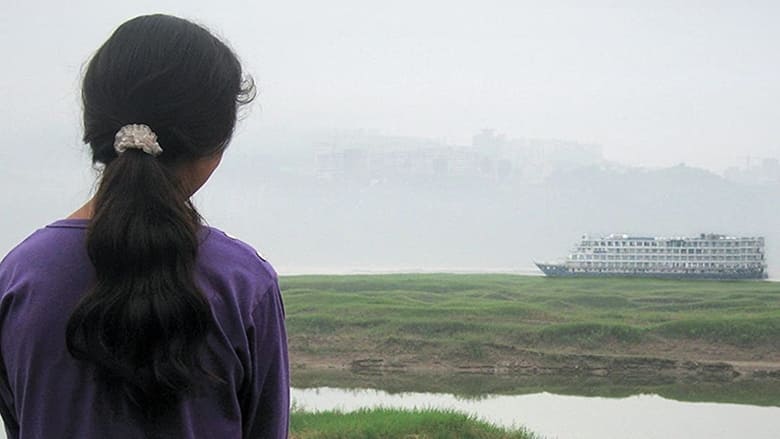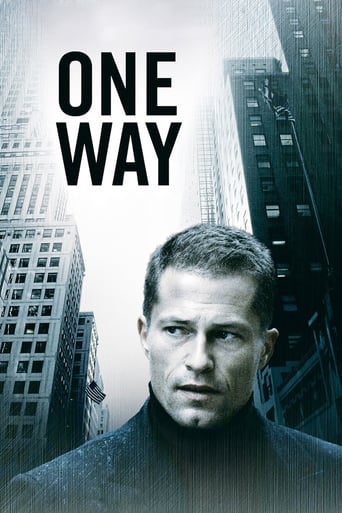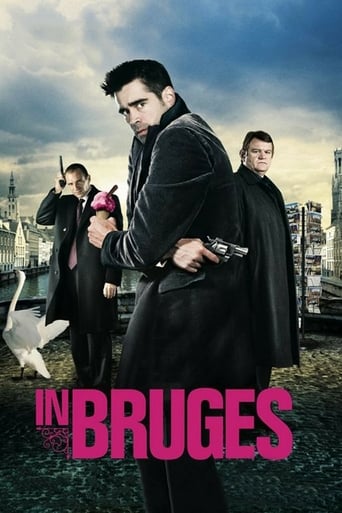

Up the Yangtze (2007)
A luxury cruise boat motors up the Yangtze - navigating the mythic waterway known in China simply as "The River." The Yangtze is about to be transformed by the biggest hydroelectric dam in history. At the river's edge - a young woman says goodbye to her family as the floodwaters rise towards their small homestead. The Three Gorges Dam - contested symbol of the Chinese economic miracle - provides the epic backdrop for Up the Yangtze, a dramatic feature documentary on life inside modern China.
Watch Trailer
Cast


Similar titles
Reviews
Sorry if you were looking for Wall-E or something else 'feel good', this is a documentary focusing on two young people at the center of change in China. The Three Gorges Dam, at the time of filming was beginning to flood areas where about 2 million people were being displaced, as we are told, for the good of the country, which appears a phrase parroted enough in the belief it will come true.'Jerry' is a Have, while 'Cindy' is a 'have not.' Both seek employment on a cruise ship for western tourists. Little is told of Jerry's family, which is apparently better off than Cindy's, which the film focuses on. Cindy's family are poor farmers who are doing fairly well, but know everything will change when their home and fields will be flooded. The hardship of change is clear and Cindy works hard to help support her family. Jerry doesn't show the same work ethic, which leaves the viewer to draw their own conclusion of traditional vs. modern values.Quite a lot of detail on modern China is available to the viewer, including frequent complaints of corruption. I was moved considerably by the contrasts and the snips of history, which show not all have prospered in modern China, though there is again parroted belief that anyone can succeed. It was also a bit surprising to see in China High School education is not a given for everyone.I found this to be a very informative and well done documentary and highly recommend it to anyone wishing to see the changes and impact of this dubious national project.
Perhaps I am the dam, as I was unmoved by this film. The promotional material I received prior to the showing of the film had prepared me to see a story about a huge dam project, with serious environmental and human consequences. So I was disappointed that the dam itself was not a major feature of the film, and no environmental issues were raised. But I can't really fault the film itself for the people who promote it, so I'll try to leave that aside. I was impressed with the access that the filmmakers had to get frank comments from a variety of people in the film, and for me that was something new that I enjoyed for a film from China. But still I found it to be a slow film of two kids who are sent by their families to work serving foreign tourists on a river tour boat, and the difficulties that first-time jobs, especially away from home, can bring to anyone. It was also about a very poor family having to move from their shack to a more densely-populated place where they will need to learn a different way of living. In both cases, I found that I was admiring people's ability to find ways to move forward, but I felt that the movie wanted me to believe that this was bad. Some scenes appeared to be included randomly, as they did not fit in with the rest of the film, such as the creepy stop-motion dancing kid, or the praying woman. On the flip side, the story of the two kids working on the boat seems to just stop without explanation after something significant happens to one. I wanted to know more about what happened to each of them. That it was in China, or on the Yangtze, seemed insignificant to the story itself. I don't feel that I know much more about life on the Yangtze, or the Three Gorges Dam, than before I saw the film. Seeing that a documentary of this type can be made in China, I feel this subject is therefore still ripe for someone else to make a more informative documentary about the Yangtze and/or the Dam.
Canadian filmmaker Yung Chang's National Film Board of Canada-sponsored documentary about the displacement of the Yangtze river and the population surrounding it by the Three Gorges Dam in China creates a vivid picture of people and transitions. But it's got a tough act to follow in the films of Jia Zhang-ke, whose recent 'Still Life' goes over similar ground in a style that feels at once more sweeping and more intimate.Chang mainly alternates between a big "luxury cruise" boat that takes North Americans and Europeans to see the river landscape before flooding changes everything, and a poor family living in an improvised riverside shack that's shabby but is in a place where there is land they can cultivate for food. In the course of the film, the family is moved up to temporary housing where they have to buy food and water and their sixteen-year-old daughter, who wanted to continue beyond middle school, struggles and makes her way up from dishwasher to dining room help on the boat. Meanwhile Chang also follows another new boat worker called "Jerry" (Chen Bu Yu) who washes out after his trial period despite being handsome and a good singer. He is accused by his supervisor of being over-confident, egotistical, and careless of others, which some Chinese think is a common byproduct of one-child families.'Up the Yangtze' is skillfully edited by Hannele Halm to underline social contrasts . It moves seamlessly back and forth between "Cindy" (as the subsistence farmer's daughter, Shui Yu, is called for her boat job) and her family's shack. We see "Jerry" boasting, drinking and swearing at a Karaoke bar before beginning his boat job. He interacts smoothly with a couple of young European men while bartending on the boat, and performs a Chinese song for an assembled audience of the tourists on board. The workers' supervisor, "Campbell" (Ping He) gives them lots of instructions. Symbolically, Chang's extensive coverage of life on the cruise boat among the young workers and their supervisors, who teach them how to tell tourists what they want to hear and not bring up controversial subjects, is a vision of China's desire to make nice with the western world on its upward path to being one of the leading nations. At the same time, this cruise boat story seems somehow peripheral to general Chinese life. Jia's 'Still Life,' with its haunting fiction of several different lives disrupted by the Three Gorges project, gives a more vivid sense of the turmoil and unpredictability of contemporary China and more specific detail about the shifting interface between people and the dam's ongoing displacements. The cruise boat story in 'Up the Yangtze' has its richer counterpoint in Jia's previous film, 'The World,' and he presented a portrait of several decades of contemporary Chinese history in his second feature film, the 2000 'Platform.' In 'Unknown Pleasures' (2002), Jia dramatized the marginal lives of semi-educated young people (like Cindy) who are caught in the swirl of transformation of the rural into the urban in China's vast economic cauldron.But Chang seems to have had excellent access to each of the worlds he chooses to focus on, and particularly to the sense of humiliation and grief some people feel in the course of things. This includes Cindy, before she leaves home; a shopkeeper who was brutally relocated; and Jerry when he begins to realize that his coworkers don't like him because he's not a team player. Chang was able to film Cindy's parents explaining why they can't send her on to further schooling, and their humble visit to the boat after she's been working there a while. Jerry seems to have characteristics that would serve him well in a western setting or a school. But though he comes from a richer family than Cindy, such opportunities are unreachable even at nineteen, and when he's banished from the river boat job, one wonders if he may end up like the young lost souls in Jia's 'Unknown Pleasures,' who face jail or worse.In 'Still Life' it's clear that people at all levels are being churned around in China, and since English is Chang's first language, it's quite possible "Up the Yangtze" is meant to evoke the words "up the river." It seems that the only value that survives is the intense desire to work and no one can really see the big picture, even though they may supervise the construction of big bridges or buildings. The recent earthquake in China is a new demonstration that planning and construction are often faulty. Since Chang's film is a documentary, you may wonder why nobody is asked whether there wouldn't have been an alternative to the giant dam with its disruption of a vast eco-system and displacement of two million people and counting. But nobody does, and Chang's access doesn't mean he could talk to policy-makers, or even mid-level bureaucrats. Like many documentarians, he has worked very well with the material that came his way. He also refers to his own family stories and trips to the area of the river--this isn't his first. The film has a strong but not obtrusive soundtrack by Olivier Alary; the cinematography of Wang Shi Qing is often striking. Jia's 'Still Life' remains a hard act to follow.Shown at Sundance, Seattle, San Francisco and other festivals, currently (June 2008) in US release in 6 theaters.
This cinema masterpiece is experience of Chinese not westerner story. I hope you will go to take in this experience and learn more about middle kingdom. This movie is fair and shows piece of Chinese life. Do not miss this masterpiece. It made me laugh it made me cry. It made me think about my homeland.this is from variety Asia online: "If the title "Up the Yangtze!" suggests "up a creek!," it's no coincidence. China's Three Gorges Dam is considered by many experts to be a full-steam-ahead eco-disaster, but helmer Yung Chang's gorgeous meditation is more concerned with the project's collateral human damage: old farmers evicted, young people in servitude to Western tourists, all brought about by an endeavor whose collective weight may ultimately tilt the Earth's axis. A gloriously cinematic doc of epic, poetic sadness, "Yangtze" should be a hit on the specialized circuit and could break out, thanks to its embrace of irony rather than righteous indignation."i think this review is right. i'm very happy for this film and i think, as a Chinese, it is important to see all of the sides of our story. that way we can grow to learn to be better.











